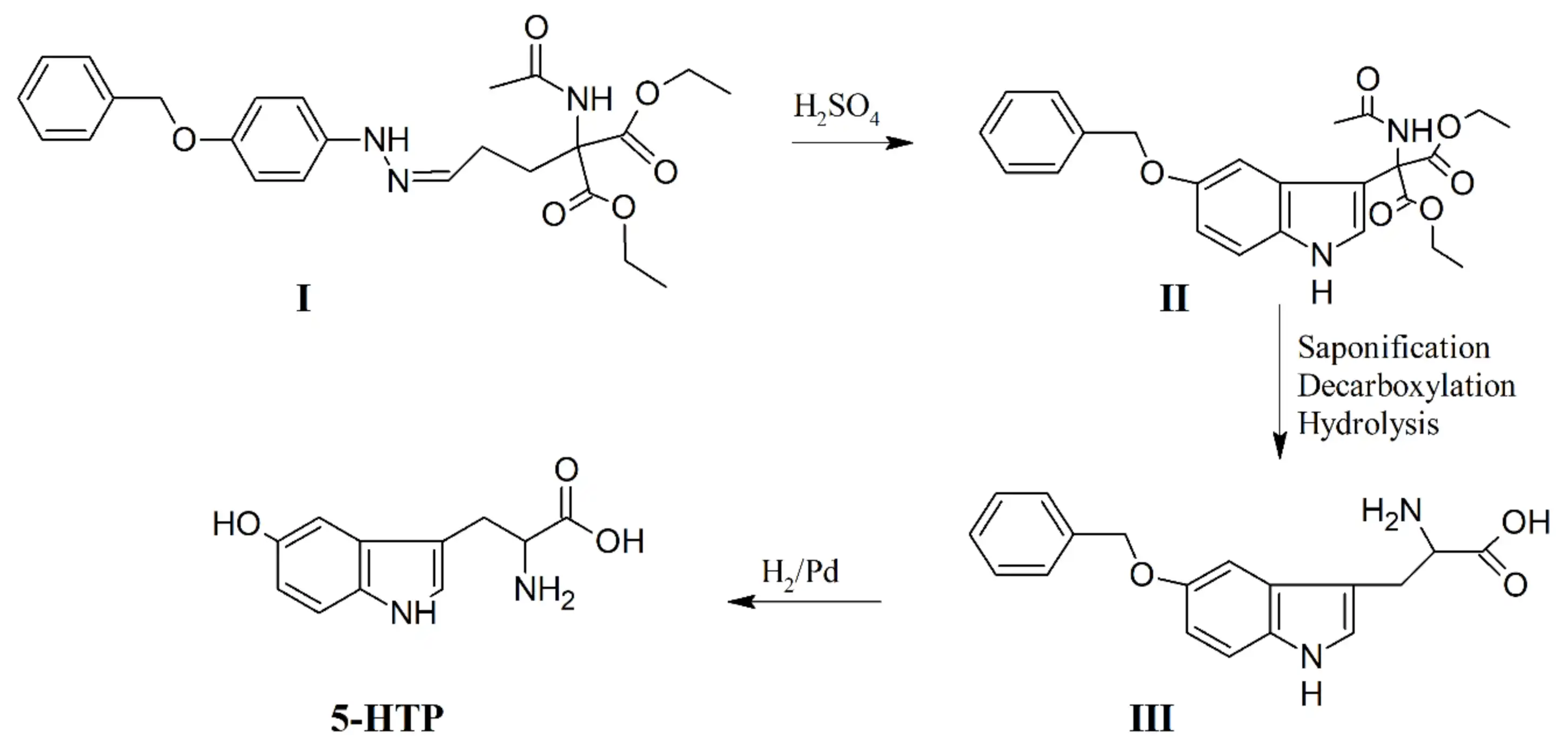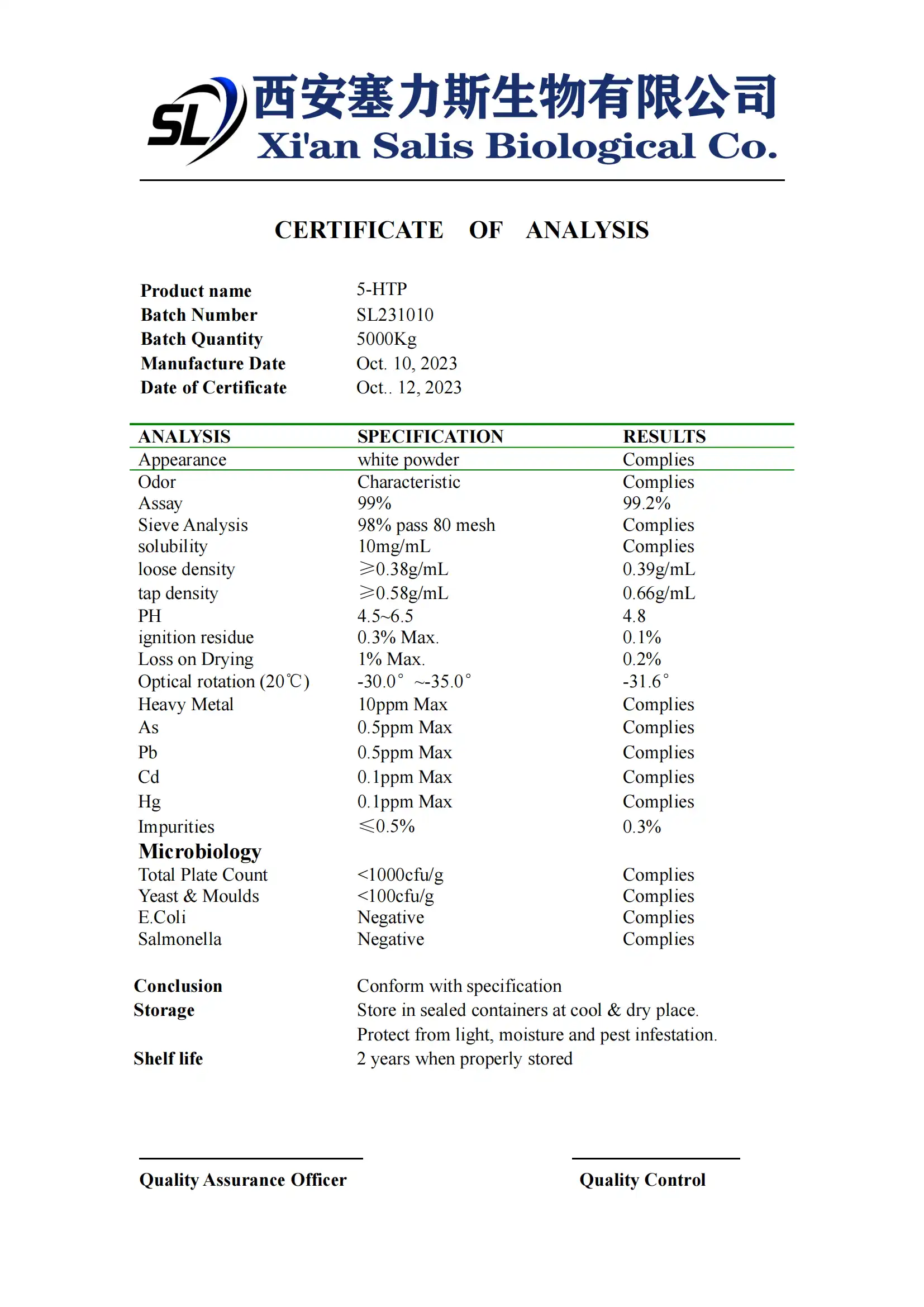5-Hydroxytryptophan Powder has gained attention as a potential natural supplement for managing depression. As a precursor to serotonin, a neurotransmitter closely linked to mood regulation, 5-HTP has sparked interest among researchers and individuals seeking alternative approaches to mental health. This blog post explores the potential benefits of 5-HTP powder for depression, its mechanisms of action, and important considerations for those contemplating its use.

How does 5-HTP work to improve mood?
5-Hydroxytryptophan Powder is a naturally occurring amino acid that plays a crucial role in the production of serotonin, a neurotransmitter often referred to as the "feel-good" chemical in the brain. The mechanism by which 5-HTP potentially improves mood is closely linked to its ability to increase serotonin levels in the central nervous system.
When consumed as a supplement, 5-HTP is readily absorbed by the body and can cross the blood-brain barrier. Once in the brain, it undergoes a conversion process facilitated by the enzyme aromatic L-amino acid decarboxylase, transforming it into serotonin. This increase in serotonin availability is thought to be the primary way 5-HTP may help alleviate symptoms of depression and improve overall mood.
Serotonin plays a vital role in regulating various physiological and psychological processes, including mood, sleep, appetite, and pain perception. By boosting serotonin levels, 5-HTP may help restore balance to these functions, potentially leading to improved emotional well-being and a reduction in depressive symptoms.
Research has shown that individuals with depression often have lower levels of serotonin in their brains. By providing the body with more of the raw material needed to produce serotonin, 5-HTP supplementation may help address this deficiency. Some studies have suggested that 5-HTP can be as effective as certain antidepressant medications in treating mild to moderate depression, although more research is needed to confirm these findings.
It's important to note that the effects of 5-HTP on mood are not instantaneous. Like many natural supplements and antidepressant medications, it may take several weeks of consistent use before noticeable improvements in mood are observed. Additionally, the effectiveness of 5-HTP can vary from person to person, and it should not be considered a substitute for professional medical advice or treatment for clinical depression.
What is the recommended dosage of 5-HTP for depression?
Determining the appropriate dosage of 5-Hydroxytryptophan Powder for depression is crucial for maximizing its potential benefits while minimizing the risk of side effects. It's important to note that there is no one-size-fits-all approach to 5-HTP supplementation, and dosages may need to be adjusted based on individual factors such as body weight, overall health, and the severity of depressive symptoms.
Generally, the recommended dosage of 5-HTP for depression ranges from 50 to 300 mg per day, taken in divided doses. Many healthcare professionals suggest starting with a lower dose, typically 50 mg taken two to three times daily, and gradually increasing the dosage over time if needed. This approach allows the body to adjust to the supplement and helps identify the minimum effective dose for each individual.
Some studies have used higher doses, up to 400 mg per day, but it's essential to consult with a healthcare provider before considering such elevated amounts. Higher doses may increase the risk of side effects and potential interactions with other medications.
The timing of 5-HTP supplementation can also play a role in its effectiveness. Some people find that taking 5-HTP with meals helps to reduce potential gastrointestinal side effects. Others report better results when taking it on an empty stomach, as this may enhance absorption. Experimenting with different timing strategies under the guidance of a healthcare professional can help determine the most effective approach for each individual.
It's crucial to remember that 5-HTP should not be combined with other medications that affect serotonin levels, such as selective serotonin reuptake inhibitors (SSRIs) or monoamine oxidase inhibitors (MAOIs), without medical supervision. Combining these substances can lead to a dangerous condition called serotonin syndrome, which can be life-threatening.
Furthermore, the duration of 5-HTP supplementation should be considered. While some individuals may experience benefits within a few weeks, others may require longer periods of consistent use. Long-term use of 5-HTP should be monitored by a healthcare provider to ensure safety and efficacy.
Are there any potential side effects of using 5-HTP for depression?
While 5-Hydroxytryptophan Powder is generally considered safe for most people when used as directed, it's important to be aware of potential side effects and interactions. As with any supplement or medication, individual responses can vary, and some people may experience adverse effects even at recommended dosages.
Common side effects of 5-HTP supplementation may include:
- Nausea
- Stomach discomfort
- Diarrhea
- Heartburn
- Drowsiness
- Headache
- Dizziness
These side effects are typically mild and often subside as the body adjusts to the supplement. Starting with a lower dose and gradually increasing it can help minimize these effects. Taking 5-HTP with food may also help reduce gastrointestinal discomfort.
In rare cases, more serious side effects have been reported, including:
- Rapid heartbeat
- Anxiety or agitation
- Muscle problems
- Severe allergic reactions
It's crucial to discontinue use and seek medical attention if any severe or persistent side effects occur.
One of the most significant concerns with 5-HTP supplementation is its potential to interact with medications that affect serotonin levels. As mentioned earlier, combining 5-HTP with SSRIs, MAOIs, or other serotonergic drugs can lead to serotonin syndrome, a potentially life-threatening condition characterized by symptoms such as confusion, rapid heart rate, high blood pressure, and in severe cases, loss of consciousness.
Additionally, 5-HTP may interact with other medications, including:
- Carbidopa (used to treat Parkinson's disease)
- Tramadol (a pain medication)
- Dextromethorphan (found in some cough medicines)
- Certain migraine medications
Given these potential interactions, it's crucial to consult with a healthcare provider before starting 5-HTP supplementation, especially if you are taking any medications or have pre-existing health conditions.
It's also worth noting that the quality and purity of 5-HTP supplements can vary widely between manufacturers. Choosing a reputable brand and looking for third-party testing certifications can help ensure you're getting a high-quality product.
Conclusion
While 5-Hydroxytryptophan Powder shows promise as a potential natural aid for depression, it's essential to approach its use with caution and under the guidance of a healthcare professional. By carefully considering dosage, potential side effects, and interactions, individuals can make informed decisions about whether 5-HTP supplementation is appropriate for their specific situation. As with any treatment for depression, 5-HTP should be part of a comprehensive approach that may include therapy, lifestyle changes, and other interventions as recommended by a healthcare provider.
If you are also interested in this product and want to know more product details, or want to know about other related products, please feel free to contact lea_slsbio@163.com,WhatsApp+86 13193326505.

References
1. Birdsall, T. C. (1998). 5-Hydroxytryptophan: a clinically-effective serotonin precursor. Alternative Medicine Review, 3(4), 271-280.
2. Shaw, K., Turner, J., & Del Mar, C. (2002). Tryptophan and 5-hydroxytryptophan for depression. Cochrane Database of Systematic Reviews, (1).
3. Javelle, F., Lampit, A., Bloch, W., Häussermann, P., Johnson, S. L., & Zimmer, P. (2020). Effects of 5-hydroxytryptophan on distinct types of depression: a systematic review and meta-analysis. Nutrition Reviews, 78(1), 77-88.
4. Hinz, M., Stein, A., & Uncini, T. (2012). 5-HTP efficacy and contraindications. Neuropsychiatric Disease and Treatment, 8, 323-328.
5. Turner, E. H., Loftis, J. M., & Blackwell, A. D. (2006). Serotonin a la carte: supplementation with the serotonin precursor 5-hydroxytryptophan. Pharmacology & Therapeutics, 109(3), 325-338.
6. Nakajima, T., Kudo, Y., & Kaneko, Z. (1978). Clinical evaluation of 5-hydroxy-L-tryptophan as an antidepressant drug. Folia Psychiatrica et Neurologica Japonica, 32(2), 223-230.

